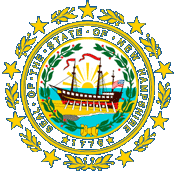 |
 |
|
SCIENCE
Foreword -
Introduction: A Philosophical Context -
K-12 Broad Goals for Science Education -
References -
Matrix
What is the K-12 Science Curriculum Framework?
The K-12 Science Curriculum Framework was developed to positively impact science education in New Hampshire. It is a thoughtful response to the variety of reform efforts currently occurring nationwide. New Hampshire educators can use these standards to help make the decisions necessary for the development of effective science programs. Although this is not a mandated curriculum, it sets forth high science education standards, essential for New Hampshire students.
The standards are organized in strands, which may be utilized in an interdisciplinary or thematic manner. The sixth strand, "Unifying Themes and Concepts" promotes integration, within the fields of science and with other subject areas, as an effective approach in teaching the science of natural systems. In each strand, the generalized standards are written to accommodate a variety of teaching methods and resources, yet they are pointed at specific concepts and skills that students should know and be able to do. The standards are written to promote learning science by doing science. This is not a curriculum in itself, but a framework, from which local curricula may be developed. Current cognitive research suggests that students learn best by constructing their own knowledge. It is the intent of this document to increase students' understanding of essential scientific concepts by promoting activities that engage students in doing science, using available technological tools, and rationally thinking about the natural world.
The Science Curriculum Framework incorporates current theory on effective and essential science teaching. It should be used, evaluated, and revised regularly to keep New Hampshire students on a progressive track towards an optimum understanding of science. The evaluation process should involve a variety of assessment tools, which reflect a variety of teaching methods. The periodic revision of this document should involve educators, parents, business and industry representatives, and state and community leaders. This is not the end of New Hampshire science education reform, it is a beginning!
To this end, the framework will serve as the foundation for the development of new assessment systems which incorporate both local and statewide components. At the state level, science proficiency will be assessed at the end of grades six and ten, providing information which can be used to promote educational accountability and to improve curriculum and the quality of instruction. Local assessment programs should build upon and complement the state effort.